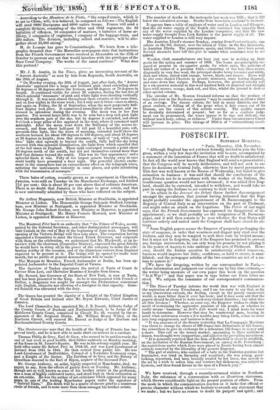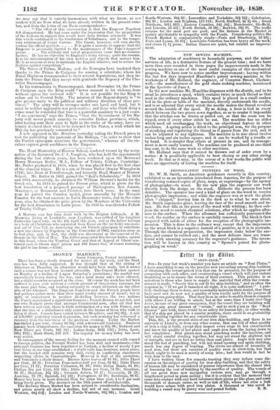We have received, through a recently-returned visitor in Northern Italy,
the substance of a conversation with an illustrious statesman, which throws considerable lighten the present position of affairs. From the mode in which the communication reaches us it lacks that official or precise character without which we hesitate to avouch any statement that we make ; but we have no reason to doubt its purport and spirit ; and
we may say that it exactly harmonizes with what we know, as our readers will see from what we have already written in the present num- ber, and from the letter of our Paris correspondent- . . . . " The effect of this conversation is that the Emperor Napoleon felt disappointed. He had come under the impression that the preparation of the Italians to support him would have been further advanced. It was this which contributed to the Conference of Villafranea, and to the tempo- rary retirement of Count Cavour. The Count, however, will very shortly resume his official position. . . . . It is quite a mistake to suppose that the Emperor is personally bigoted to the maintenance of the Pope's temporal
power The military and naval preparations cause hinisao dissatis- faction. He has no objection to England's being strong; quite theseverse. It is the misconception of his own motives and objects that annoys him. He is as anxious as ever to maintain the English alliance, and to secure the Italians against compulsion."
The States of Parma, Modena, and the Romagna have tendered their thanks to the Prince de Carignan for naming a substitute, whom his Royal Highness recommended to their several deputations, and they in- form the Prince that they accept with gratitude the Regency of the Che- valier Buoneompagni. In his instructions to Buoneompagni, dated November 14, the Prince de Carignan says the King could never consent to let violence from without oppose the national will." It is not possible for the King to refuse aid to Central Italy. The mission of the Regent-deputy is "to give greater unity to the political and military direction of those pro- vinces." The army will be stronger under one hand and head, but it must be neither aggressive nor provocative; and those who think delay a crime must be reminded that time is a powerful auxiliary to a just cause. "I am convinced," says the Prince, "that the Government of his Ma- jesty will never permit anarchy to convulse Italian provinces, which, after having sent their sons to fight in the ranks of the army, have so- lemnly declared their wish to be annexed to his States, a wish which his Majesty has graciously consented to." A note appeared in the Moniteur yesterday taking the French press to task for publishing the pastorals of the Bishops, "in order to show that the French episcopate mistrusts the government," whereas all the cir- culars express great confidence in the Emperor.



























 Previous page
Previous page